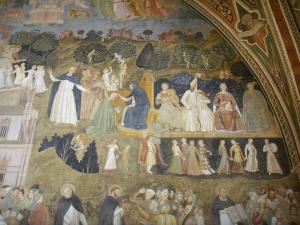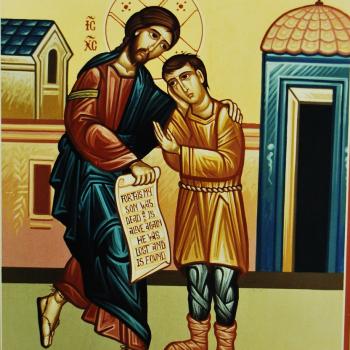
There are many doctrinal and dogmatic statements made by the church which., while true, they are true only when the meaning of those statements are properly understood. If the original intent is ignored, and the words are engaged in a literal fashion, according to other meanings of those words other than originally understood by the authors of such statements, those same statements can lead people to believing something which is false, indeed, heretical. For all dogmatic statements, all doctrinal statements, are conventions meant to point to a truth beyond themselves. The absolute truth, and therefore, many dogmatic and doctrinal teachings of the Christian faith, while they can be apprehended by human speech and so represented by it, cannot be contained or comprehended by it. When we try to turn such conventions into absolutes, we cut ourselves off from the absolute; similarly, if focus on the words being used, becoming stuck with the way we now interpret those words without understanding how they were interpreted when they were first used, we can find our understanding of the doctrines contradicting what they intend to teach us. Too many dogmatic debates in Christian history have come about because people cannot appreciate the fact that they can and will use different words, different conventions, to mean the same thing. They might use the same words, but because they use the words differently, often in ways which are opposite from each other, it can be appear they are speaking against each other but in reality, they are both trying to promote the same teaching. We need to do more than read and memorize doctrinal and dogmatic propositions and repeat them. We need to engage them, to look beyond the words used and instead discern what was intended by those declaration. When we do so, we will find out, once again, Paul was right in saying we should follow the spirit instead of the letter, for the spirit gives life, and the letter brings destruction. Perhaps one great example of this comes from the statement: “There is no salvation outside of the Catholic Church.” Over the years, many, including many theologians, have misunderstood the intent behind this declaration; they end up believing that what is being said is that someone has to be a visible member of the institutional church, the Catholic Church, while they are alive and remain in communion with the Pope if they are to be saved. This leads them to say draw conclusions such as that those who do not know about the institutional church, who have no means of knowing it, have no chance of salvation (leading to some perverted kind of providential exclusivism). While it is easy to see why many, like the Feeneyites, take this stand, it is not the interpretation that Christian history has given to these words, for we find, the same people who say this, find ways to show how those who were not a part of the institutional church could still be saved, This is why the Feeneyites were told they were wrong when they tried to engage such a simplistic reading of those words, and why they were told they had to change their understanding of them if they were to remain in communion with the Catholic Church they said everyone needs to be in communion with if they are to be saved.
“No salvation outside of the Catholic Church” simply means that anyone who is saved will find themselves to somehow be a part of the Catholic ( universal) Church, that is, the mystical body of Christ. What we do not know, and what the words do not say, is how many ways someone could be a part of the church. Christian tradition has long recognized that many who, during their temporal existence, were not Christian, and so were not a member of the institutional church, could be saved. If they are saved, it is still in and through the church, though in a more implicit than explicit way. The church is described as catholic because it is universal, indeed, inclusive in its nature. All those who, at the eschatological judgment, find themselves welcomed into the kingdom of God, that is saved, will discover that Christ has found a way to incorporate or assume them into his mystical body, and so will find that they have been brought into the church even if they did not know they were. This is exactly what Jesus indicated would happen when he discussed the eschatological judgment: many will be surprised they are welcomed into the kingdom of God, but Christ will say, they interacted with him and joined themselves to him through their pursuit of what is good and true, and through that pursuit Christ knew them (as he knows all who are saved, as being a part of his mystical body). Similarly, Scripture made it clear: God desires that all shall be saved, and Jesus came into the world to help make this happen. He will do all that he can to save as many people as possible, seeking out the lost sheep instead of letting them perish.
Cardinal Journet, being strongly influenced by St. Thomas Aquinas in his arguments and reasoning, pointed out how many can and will be found in the church and among the saved despite the fact they appear to be outside it. He said that God is always offering a prophetic light, something which guides everyone, showing them ways to pursue what is good. If they do so, if they follow it and embrace the good which they know, they find themselves being directed towards God, and so, find themselves open to God (and Christ) and all the grace which Christ offers them, even if they do so implicitly instead of explicitly. He uses the example of an unbaptized child to show us what this means:
At a given moment the child, even if we suppose it unbaptized, brought up in a society that is animist, polytheist, et cetera, is compelled to choose for or against rational human good, proper to man. The good to be done, the evil to be avoid, then becomes known to him, though in a confused way, through an idea, a judgment, that is imperative. If he chooses this good, without yet even thinking explicitly either of God or his final end, what is his state? He is tending at once and directly, even though he is unaware of it, toward the good without which the good proper to man would not exist for a single instant, towards God, the final end of human life. [1]
The desire to follow the good, to do good, and to embrace the good, is the foundation which God (through Jesus) uses to share grace to the world. Everyone, and not just those given an explicit presentation of the Gospel, have an opportunity for grace. Everyone has a way to be incorporated into the church, even if they do not know of the church. This is why there will be many who will be found being within the church whom the institutional church did not know was a part of the church:
And yet we know that God, who wills that all men should be saved and come to the knowledge of the truth, continues, as a result of the redemptive prayer of Jesus, to send these same first rays of light to spiritual regions that have remained closed to the message of the Judeo-Christian revelation. Hence I am convinced that the Church is wider than is supposed, that she possesses children everywhere children who do not know her, and whom she does not know. [2]
But, as Jesus made clear in his description of the last judgment, Christ himself knows them, even if the institutional church does not, and all whom Christ knows in this way will be revealed in the eschaton:
In the case of an unbaptized child it is indeed in the very process of their first free act that they encounter, not yet the authority, but still the mystery, of the Church. The prophetic light falls on them to show them the good of salvation, the good by which they can be saved, the sanctifying light that urges them to assent to it, this is already the presence in them of the Church, which is holy and Catholic. If they assent to these lights, they are at once undoubtedly joined, initially, imperfectly, yet in a way that brings salvation, to the great universal Church entrusted here below to the jurisdiction of Peter and of the sovereign pontiff (they do not know the Church, and neither does she know them by name), of which Christ is the head (they do not know him, but he knows them by name).[3]
To say there is no salvation outside of the Catholic Church, therefore, is not a statement denying salvation to those who do not know or properly understand the message of the Gospel, who have had no contact with the institutional church. It is also not a statement denying salvation to those who know of the institution, but because of the problems of the institution and the abuses found in it, are unable to join themselves to it. Rather, it is a reminder that the church is where salvation is to be found, and so all who are saved, will be shown to be a part of that church. To understand this better, we should listen to John Meyendorff when he said:
The Church is not a human organization, ruled by any of the systems which man may devise – democracy, autocracy, clergy-rule or laity-rule—but a temple of God, where God and man meet, where man is being led to eternal life, where God, in His mercy, gives to men and women the privilege of being His sons and daughters.[4]
The Church is where God and humanity meet; they meet in Christ, because he is both human and divine. If we are saved, we will find that we have been joined to Christ and so find ourselves being a part of his mystical body, and with it, the universal or catholic church (which is more than the institutional church). We become children of God, and, as children of God, we will wish for what God wishes, that is, for the salvation of all. The more, then, we open ourselves to God, to the teachings of the Gospel, the more we will find ourselves looking for and hoping for the salvation of all. We will not try to treat salvation as our own exclusive thing, but rather, something God wants to share with all, doing so in as many ways as is possible. We will understand teachings about salvation with the understanding that they will not circumvent God’s attempt to save all. That is, we will not engage any hermeneutic to interpret dogmatic statements in a way which suggests salvation is an exclusive gift to a few. We will understand all such declarations come from human conventions, with intended meanings which go beyond a literalistic (or legalistic) interpretation of those conventions. This is why, when we read statements which as those which say there is, “No salvation outside of the Catholic Church,” we must not take it in a simple manner, thinking it is telling us everyone needs to be joined with the institutional Catholic church while they are alive if they are to be saved. It is true, those words can be quite confusing, especially as they have often been taken out of the original context in which they were stated, which is why it is best to possibly say what was intended by them with other convention. But in doing so, we must acknowledge the original convention, recognize its role in Christian history, and that it was trying to point to a truth, which, if we understand that truth, we can accept even if we find the words used to convey it having become problematic over time. For, if we do not do this, there will be many who, looking to the Christian tradition, will say that they represent a truth which Christians have ignored, and they will be able to persuade people to engage them in a fashion they were never meant to be taken.
[1] Charles Cardinal Journet, What is Dogma? Trans. Mark Pontifex OSB (New York: Hawthorn books, 1964; repr. San Francisco: Ignatius Press, 2011), 39.
[2] Charles Cardinal Journet, What is Dogma?, 46.
[3] Charles Cardinal Journet, What is Dogma?,43-4.
[4] John Meyendorff, Vision of Unity (Crestwood, NY: St. Vladimir’s Seminary Press, 1987). 177.
Stay in touch! Like A Little Bit of Nothing on Facebook.
If you liked what you read, please consider sharing it with your friends and family!
N.B.: While I read comments to moderate them, I rarely respond to them. If I don’t respond to your comment directly, don’t assume I am unthankful for it. I appreciate it. But I want readers to feel free to ask questions, and hopefully, dialogue with each other. I have shared what I wanted to say, though some responses will get a brief reply by me, or, if I find it interesting and something I can engage fully, as the foundation for another post. I have had many posts inspired or improved upon thanks to my readers.












